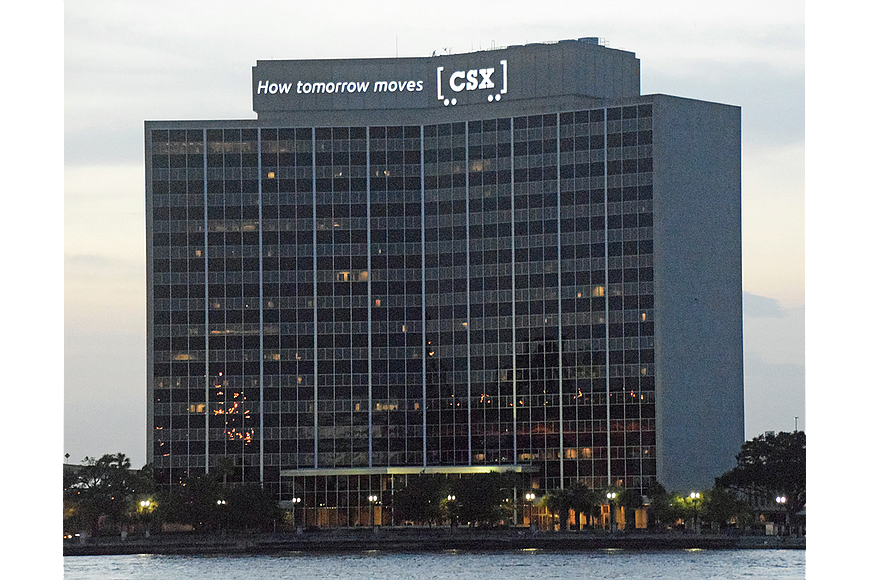
CSX Corp. freight customers had a reason to complain about service disruptions as the Jacksonville-based railroad overhauled operations last summer, CEO James Foote admits.
However, while there still is more work to be done, he said he thinks operations have improved enough that customers should be satisfied.
“I have nothing today to apologize for,” Foote said Wednesday at an investor conference in New York held by J.P. Morgan.
CSX’s implementation of the Precision Scheduled Railroading plan started by Foote’s predecessor, Hunter Harrison, got off to a bumpy start last year with numerous complaints about service.
“Our customers were right to express their frustration with us,” Foote said at the conference, which was broadcast over the internet.
He expects service metrics to continue improving, but he also says they already have reached a high level.
“We’re running better today than I think anybody else in North America,” Foote said.
Foote said CSX has been communicating with freight customers and with federal regulators about its operational improvements.
“All of the customers understand what it is we’re trying to accomplish and they want us to be a better-run railroad,” he said.
CSX cut 4,600 jobs last year, including consultant positions, and expects to cut 6,200 more over the next three years.
At last week’s conference, Foote was asked again about morale among employees as the company transforms.
“Without a doubt, our management employees are clearly engaged and on board,” he said.
“In terms of the rank and file, again there was a significant amount of shock to the system when the changes were made,” he said.
But Foote said he believes “morale is turning around, improving,” as he communicates with employees about the changes.
“My sense is everyone is moving and pulling in the right direction,” he said.
Foote, who joined CSX in October and was promoted to CEO in December after Harrison’s death, also was asked about succession plans. Most of CSX’s top executives in place before Harrison came in a year ago have left the company.
Foote said he is looking at current managers in the company to “give the guys inside a shot” at proving themselves.
“As time goes by, we’ll see,” he said.
International Baler Corp. reported earnings of $198,689, or 4 cents a share, for the first quarter ended Jan. 31, reversing a small net loss the previous year.
Sales for the Jacksonville-based company jumped from $2.2 million in the first quarter of fiscal 2017 to $4 million in this year’s first quarter.
In its quarterly report filed with the Securities and Exchange Commission, the company said the increase resulted from higher shipments of auto-tie balers this year. International Baler shipped nine of the machines in this year’s first quarter, compared with three the previous year.
Cannae Holdings Inc. last week reported a net loss of $4.7 million, or 7 cents a share, in the fourth quarter, its first quarter as an independent company.
The company was an investment subsidiary of Fidelity National Financial Inc., which the Jacksonville-based title insurer spun off in November.
Cannae is headquartered in Las Vegas but is run by top executives of Fidelity, including Chairman Bill Foley, who now lives in Las Vegas.
Cannae’s main business is its majority stake in American Blue Ribbon Holdings, operator of several restaurant chains.
It also owns stakes in human resources technology company Ceridian HCM Holding Inc. and health care documentation company T-System Holdings.
The restaurant business accounted for $298.6 million of Cannae’s $317.4 million in fourth-quarter revenue.
During Cannae’s conference call last week, President Brent Bickett (who also is a Fidelity executive vice president) said Cannae is working on a reorganization of the restaurant business with minority partner Newport Global.
Under the plan, Cannae would end up with full ownership of two restaurant chains, O’Charley’s and Ninety Nine. Newport would own 95 percent of the remaining restaurant businesses, with Cannae retaining a 5 percent stake.
“This proposed reorganization transaction would simplify our investment in ABRH and enable us to focus our attention on ABRH’s two largest restaurant concepts,” Bickett said.
Investment firm Thomas H. Lee Partners, which had been the largest shareholder of another Fidelity spinoff, Black Knight Inc., continues to reduce its stake in the Jacksonville-based mortgage technology company.
After Fidelity spun off its majority stake in Black Knight in October, Thomas H. Lee sold 7 million shares in November and 8 million more shares in February.
Last week, Thomas H. Lee filed a registration statement with the SEC to sell another 8 million Black Knight shares. That will leave the firm with about 12.1 million Black Knight shares, or 8 percent of the company’s stock.
The sales by Thomas H. Lee makes investment firm T. Rowe Price the largest Black Knight stockholder. According to a recent SEC filing, T. Rowe Price controls 13.2 percent of the stock.
Highstar Capital, which controlled Advanced Disposal Services Inc. before its October 2016 initial public offering, continues to reduce its stake in the Ponte Vedra-based waste services company.
Affiliates of Highstar last week sold 10 million of their nearly 22 million shares of Advanced Disposal for $22.40 a share. That reduces Highstar’s stake from 25 percent to 14 percent.
Highstar controlled 63.7 percent of the stock before the IPO, when Advanced Disposal issued new shares to the public and reduced Highstar’s stake below 50 percent.
Since the IPO, Highstar sold off 14 million shares in May 2017 and sold another 6 million in December.